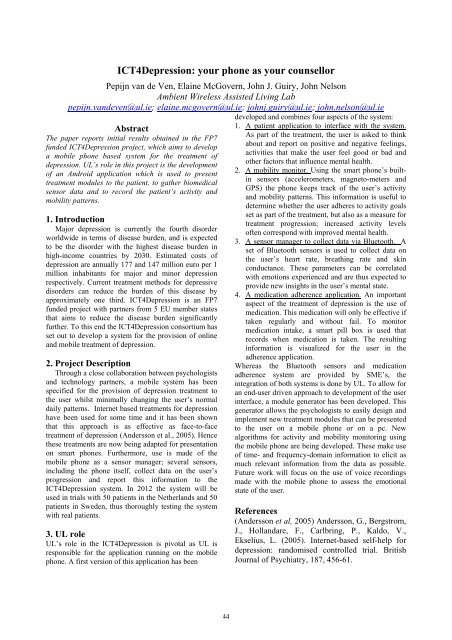NUI Galway – UL Alliance First Annual ENGINEERING AND - ARAN ...
NUI Galway – UL Alliance First Annual ENGINEERING AND - ARAN ...
NUI Galway – UL Alliance First Annual ENGINEERING AND - ARAN ...
Create successful ePaper yourself
Turn your PDF publications into a flip-book with our unique Google optimized e-Paper software.
ICT4Depression: your phone as your counsellor<br />
Pepijn van de Ven, Elaine McGovern, John J. Guiry, John Nelson<br />
Ambient Wireless Assisted Living Lab<br />
pepijn.vandeven@ul.ie; elaine.mcgovern@ul.ie; johnj.guiry@ul.ie; john.nelson@ul.ie<br />
Abstract<br />
The paper reports initial results obtained in the FP7<br />
funded ICT4Depression project, which aims to develop<br />
a mobile phone based system for the treatment of<br />
depression. <strong>UL</strong>’s role in this project is the development<br />
of an Android application which is used to present<br />
treatment modules to the patient, to gather biomedical<br />
sensor data and to record the patient’s activity and<br />
mobility patterns.<br />
1. Introduction<br />
Major depression is currently the fourth disorder<br />
worldwide in terms of disease burden, and is expected<br />
to be the disorder with the highest disease burden in<br />
high-income countries by 2030. Estimated costs of<br />
depression are annually 177 and 147 million euro per 1<br />
million inhabitants for major and minor depression<br />
respectively. Current treatment methods for depressive<br />
disorders can reduce the burden of this disease by<br />
approximately one third. ICT4Depression is an FP7<br />
funded project with partners from 5 EU member states<br />
that aims to reduce the disease burden significantly<br />
further. To this end the ICT4Depression consortium has<br />
set out to develop a system for the provision of online<br />
and mobile treatment of depression.<br />
2. Project Description<br />
Through a close collaboration between psychologists<br />
and technology partners, a mobile system has been<br />
specified for the provision of depression treatment to<br />
the user whilst minimally changing the user’s normal<br />
daily patterns. Internet based treatments for depression<br />
have been used for some time and it has been shown<br />
that this approach is as effective as face-to-face<br />
treatment of depression (Andersson et al., 2005). Hence<br />
these treatments are now being adapted for presentation<br />
on smart phones. Furthermore, use is made of the<br />
mobile phone as a sensor manager; several sensors,<br />
including the phone itself, collect data on the user’s<br />
progression and report this information to the<br />
ICT4Depression system. In 2012 the system will be<br />
used in trials with 50 patients in the Netherlands and 50<br />
patients in Sweden, thus thoroughly testing the system<br />
with real patients.<br />
3. <strong>UL</strong> role<br />
<strong>UL</strong>’s role in the ICT4Depression is pivotal as <strong>UL</strong> is<br />
responsible for the application running on the mobile<br />
phone. A first version of this application has been<br />
44<br />
developed and combines four aspects of the system:<br />
1. A patient application to interface with the system.<br />
As part of the treatment, the user is asked to think<br />
about and report on positive and negative feelings,<br />
activities that make the user feel good or bad and<br />
other factors that influence mental health.<br />
2. A mobility monitor. Using the smart phone’s builtin<br />
sensors (accelerometers, magneto-meters and<br />
GPS) the phone keeps track of the user’s activity<br />
and mobility patterns. This information is useful to<br />
determine whether the user adheres to activity goals<br />
set as part of the treatment, but also as a measure for<br />
treatment progression; increased activity levels<br />
often correspond with improved mental health.<br />
3. A sensor manager to collect data via Bluetooth. A<br />
set of Bluetooth sensors is used to collect data on<br />
the user’s heart rate, breathing rate and skin<br />
conductance. These parameters can be correlated<br />
with emotions experienced and are thus expected to<br />
provide new insights in the user’s mental state.<br />
4. A medication adherence application. An important<br />
aspect of the treatment of depression is the use of<br />
medication. This medication will only be effective if<br />
taken regularly and without fail. To monitor<br />
medication intake, a smart pill box is used that<br />
records when medication is taken. The resulting<br />
information is visualized for the user in the<br />
adherence application.<br />
Whereas the Bluetooth sensors and medication<br />
adherence system are provided by SME’s, the<br />
integration of both systems is done by <strong>UL</strong>. To allow for<br />
an end-user driven approach to development of the user<br />
interface, a module generator has been developed. This<br />
generator allows the psychologists to easily design and<br />
implement new treatment modules that can be presented<br />
to the user on a mobile phone or on a pc. New<br />
algorithms for activity and mobility monitoring using<br />
the mobile phone are being developed. These make use<br />
of time- and frequency-domain information to elicit as<br />
much relevant information from the data as possible.<br />
Future work will focus on the use of voice recordings<br />
made with the mobile phone to assess the emotional<br />
state of the user.<br />
References<br />
(Andersson et al, 2005) Andersson, G., Bergstrom,<br />
J., Hollandare, F., Carlbring, P., Kaldo, V.,<br />
Ekselius, L. (2005). Internet-based self-help for<br />
depression: randomised controlled trial. British<br />
Journal of Psychiatry, 187, 456-61.
















